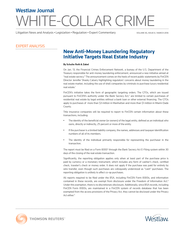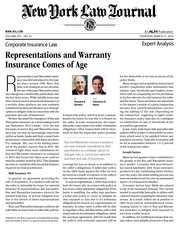New Anti-Money Laundering Regulatory Initiative Targets Real Estate Industry – March 2016
Schulte Roth & Zabel
Description
WESTLAW JOURNAL WHITE-COLLAR CRIME
See 31 U.S.C.A. § 5312(a)(2)(U) (defining financial institution to include “persons involved in real
estate closings and settlements”).
8
Louise Story, U.S. Will Track Secret Buyers of Luxury Real Estate, N.Y. Times, Jan.
13, 2016, http://www. nytimes.com/2016/01/14/us/us-will-track-secret-buyers-of-luxury-real-estate.html. 9 (L-R top row): Jeffrey A. Lenobel, Gary Stein, Betty Santangelo, Lisa A. Prager; (L-R bottom row): Julian M. Wise, Jennifer M.
Opheim, Seetha Ramachandran and Melissa G.R. Goldstein are attorneys with Schulte Roth & Zabel. ©2016 Thomson Reuters. This publication was created to provide you with accurate and authoritative information concerning the subject matter covered, however it may not necessarily have been prepared by persons licensed to practice law in a particular jurisdiction.
The publisher is not engaged in rendering legal or other professional advice, and this publication is not a substitute for the advice of an attorney. If you require legal or other expert advice, you should seek the services of a competent attorney or other professional. For subscription information, please visit www. West.Thomson.com. © 2016 Thomson Reuters MARCH 2016 n VOLUME 30 n ISSUE 6 | 3 .
13, 2016, http://www. nytimes.com/2016/01/14/us/us-will-track-secret-buyers-of-luxury-real-estate.html. 9 (L-R top row): Jeffrey A. Lenobel, Gary Stein, Betty Santangelo, Lisa A. Prager; (L-R bottom row): Julian M. Wise, Jennifer M.
Opheim, Seetha Ramachandran and Melissa G.R. Goldstein are attorneys with Schulte Roth & Zabel. ©2016 Thomson Reuters. This publication was created to provide you with accurate and authoritative information concerning the subject matter covered, however it may not necessarily have been prepared by persons licensed to practice law in a particular jurisdiction.
The publisher is not engaged in rendering legal or other professional advice, and this publication is not a substitute for the advice of an attorney. If you require legal or other expert advice, you should seek the services of a competent attorney or other professional. For subscription information, please visit www. West.Thomson.com. © 2016 Thomson Reuters MARCH 2016 n VOLUME 30 n ISSUE 6 | 3 .









